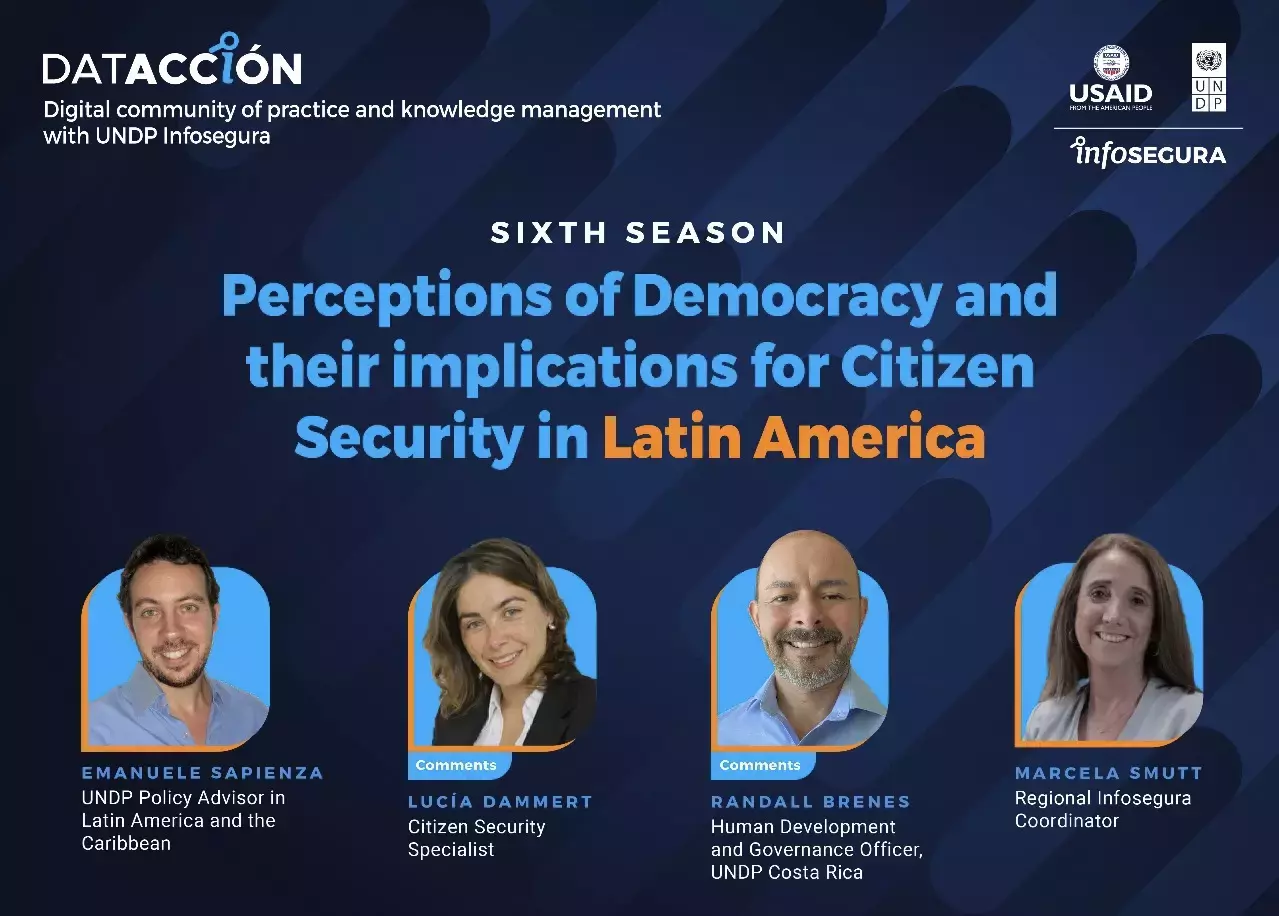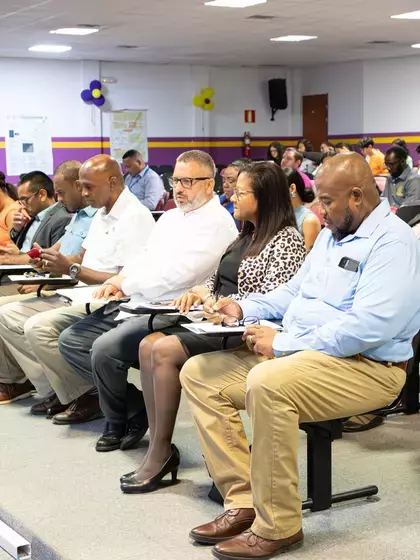Perceptions of Democracy and the Implications for Citizen Security in Latin America

On 5 October, a discussion on democracy and the implications it has for citizen security in Latin America and the Caribbean was featured on Season Six Episode Seven of DatAction, the digital community of practice and knowledge sharing produced by InfoSegura Regional Project of the United Nations Development Programme (UNDP) with the support of the United States Agency for International Development (USAID).
Satisfaction with democracy as a form of government has been on the decline in Latin America in recent years. The most recent Latinobarometer showed that only 48 per cent of the population supported democracy throughout the region in 2023, a 15 percentage point-reduction from 63 per cent support in 2010. This public opinion study conducts 20,000 interviews in 18 countries across Latin America, covering over 600 million de people.
The study revealed that 28 per cent of citizens said that the political regime in the country matters little to them, while 17 per cent of the population in the region stated a form of authoritarian government is preferable.
This complex and multi pronged issue was the focus of the discussion on DatAction, which over the years has become a regional point of reference for generating opinion on citizen security. The exchange involved three subject-matter experts from across the region: Emanuele Sapienza, UNDP Policy Adviser in Latin America and the Caribbean, Lucía Dammert, Citizen Security Specialist and Randall Brenes, Human Development and Governance Officer. UNDP Costa Rica.
Opening the discussion, UNDP expert Emanuele Sapienza noted, "we observe that commitment to democracy is weakening at the regional level," and this has to do with mounting dissatisfaction with the performance of this system of government in light of the perception of corruption, and the perception of economic inequality.
Sapienza spotlighted two clusters whose dissatisfaction is most apparent: Youth ages 18 to 25 and the lower middle class. Together they are identified as the "almost" middle class. This is a "disquieting" trend, according to Sapienza, because, "historically this group has been one of the most committed to the values of democracy, but is now one of the most disappointed."
"The disappointment can clear the way for responses to crime and violence that are not fully compatible with democratic values," cautioned Sapienza, particularly in matters of accountability, especially that of the executive power, and of human rights protection.
Citizen security expert Lucía Dammert followed up by listing some of the causes behind citizen disappointment with democracy, and noted that there is a widely held view that "our political elites are not working for everyone, but just for a few, in some cases, just for themselves."
Dammert noted that, in theory, the primary function of the State is to ensure the security of the citizens. "It may fail to provide health care, it may not provide education, pensions may be suboptimal, but we expect the State to at least provide us with safety." In her opinion, this is not achieved, making "security policies more urgent every day." Consequently, there need to be assurances that they "are not only efficient in terms of results, but these results also need to be in the framework of the Rule of Law."
Questioning democracy and demanding results, "quickly ushers in policies where excessive force or opacity are the only tools that citizens see as achievements," noted Dammert, who feels that, "this is very troubling, because it opens the door to permanent states of exception, or massive apprehension of young people, and that door opens to a path that generally reverts to even greater levels of violence."
Lastly, Randall Brenes presented the idea that democracy is a system for community living based on equal rights for all, and that coexistence is "or should be" essentially peaceful. Violence and insecurity are "anomalies" in the system, and erode this system of community life.
That is why the perception that security policy results "do not seem to have been sufficiently satisfactory," analysed Brenes, "has led to disaffection with democracy, because of its inability to solve problems that affect people the most." Brenes encouraged the audience to consider whether it is an actual rejection of democracy, whether it has deteriorated because of the population's expectations have gone unmet, "or is there a real preference for authoritarian systems."
"If our discussions are not based on evidence, science, data," concluded the Costa Rican specialist, "we can wander astray into an era of authoritarianism, where there will be no long-term solutions to the real issues at hand."
In her closing remarks, Marcela Smutt, Coordinator of InfoSegura Regional Project, thanked the three guests for their interventions and underscored the need to find policies that result in, "quick but sustainable outcomes," and warned that Latin America remains one of the regions where levels of inequality and crime rates are the highest.
Smutt recalled the importance of data in strengthening State capacities. Reliable data provides for citizen security policymaking that is evidence-based and people-centred, with a multidimensional approach that is gender responsive.
She then invited all present to participate in the next DatAction episode on 26 October, as well as the CONOSE network webinars.
Watch in YouTube.





